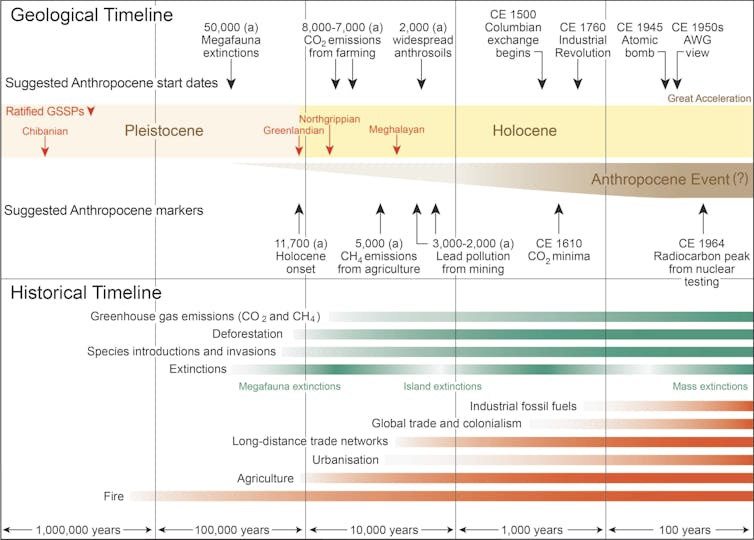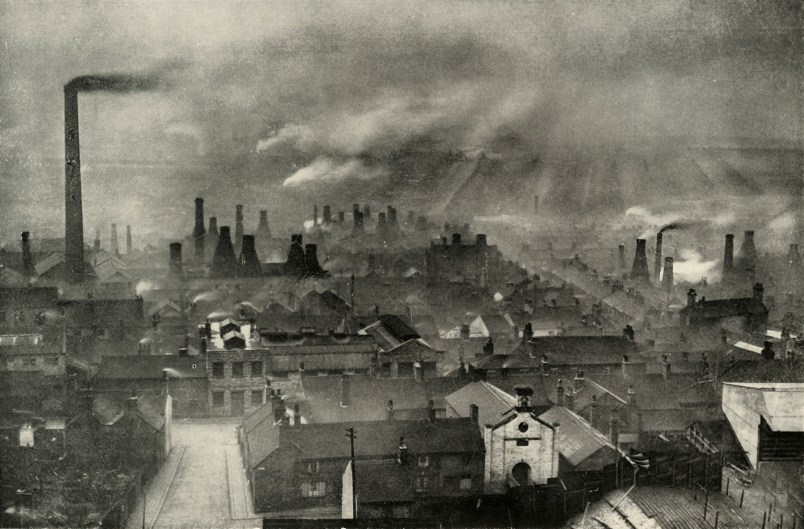This article is part of TPM Cafe, TPM’s home for opinion and news analysis. It was originally published at The Conversation.
When people talk about the “Anthropocene,” they typically picture the vast impact human societies are having on the planet, from rapid declines in biodiversity to increases in Earth’s temperature by burning fossil fuels.
Such massive planetary changes did not begin all at once at any single place or time.
That’s why it was controversial when, after over a decade of study and debate, an international committee of scientists – the Anthropocene Working Group – proposed to mark the Anthropocene as an epoch in the geologic time scale starting precisely in 1952. The marker was radioactive fallout from hydrogen bomb tests.
On March 4, 2024, the commission responsible for recognizing time units within our most recent period of geologic time – the Subcommission on Quarternary Stratigraphy – rejected that proposal, with 12 of 18 members voting no. These are the scientists most expert at reconstructing Earth’s history from the evidence in rocks. They determined that adding an Anthropocene Epoch – and terminating the Holocene Epoch – was not supported by the standards used to define epochs.
To be clear, this vote has no bearing on the overwhelming evidence that human societies are indeed transforming this planet.
As an ecologist who studies global change, I served on the Anthropocene Working Group from its start in 2009 until 2023. I resigned because I was convinced that this proposal defined the Anthropocene so narrowly that it would damage broader scientific and public understanding.
By tying the start of the human age to such a recent and devastating event – nuclear fallout – this proposal risked sowing confusion about the deep history of how humans are transforming the Earth, from climate change and biodiversity losses to pollution by plastics and tropical deforestation.
The original idea of the Anthropocene
In the years since the term Anthropocene was coined by Nobel Prize-winning atmospheric chemist Paul Crutzen in 2000, it has increasingly defined our times as an age of human-caused planetary transformation, from climate change to biodiversity loss, plastic pollution, megafires and much more.
Crutzen originally proposed that the Anthropocene began in the latter part of the 18th century, as a product of the Industrial age. He also noted that setting a more precise start date would be “arbitrary.”
According to geologists, we humans have been living in the Holocene Epoch for about 11,700 years, since the end of the last ice age.
Human societies began influencing Earth’s biodiversity and climate through agriculture thousands of years ago. These changes began to accelerate about five centuries ago with the colonial collision of the old and new worlds. And, as Crutzen noted, Earth’s climate really began to change with the increasing use of fossil fuels in the Industrial Revolution that began in the late 1700s.

The Anthropocene as an epoch
The rationale for proposing to define an Anthropocene Epoch starting around 1950 came from overwhelming evidence that many of the most consequential changes of the human age shifted upward dramatically about that time in a so-called “Great Acceleration” identified by climate scientist Will Steffen and others.
Radioisotopes like plutonium from hydrogen bomb tests conducted around this time left clear traces in soils, sediments, trees, corals and other potential geological records across the planet. The plutonium peak in the sediments of Crawford Lake in Ontario, Canada – chosen as the “golden spike” for determining the start of the Anthropocene Epoch – is well marked in the lake bed’s exceptionally clear sediment record.
The Anthropocene Epoch is dead; long live the Anthropocene
So why was the Anthropocene Epoch rejected? And what happens now?
The proposal to add an Anthropocene Epoch to the geological time scale was rejected for a variety of reasons, none of them related to the fact that human societies are changing this planet. In fact, the opposite is true.
If there is one main reason why geologists rejected this proposal, it is because its recent date and shallow depth are too narrow to encompass the deeper evidence of human-caused planetary change. As geologist Bill Ruddiman and others wrote in Science Magazine in 2015, “Does it really make sense to define the start of a human-dominated era millennia after most forests in arable regions had been cut for agriculture?”
Discussions of an Anthropocene Epoch aren’t over yet. But it is very unlikely that there will be an official Anthropocene Epoch declaration anytime soon.
The lack of a formal definition of an Anthropocene Epoch will not be a problem for science.
A scientific definition of the Anthropocene is already widely available in the form of the Anthropocene Event, which basically defines Anthropocene in simple geological terms as “a complex, transformative, and ongoing event analogous to the Great Oxidation Event and others in the geological record.”
So, despite the “no” vote on the Anthropocene Epoch, the Anthropocene will continue to be as useful as it has been for more than 20 years in stimulating discussions and research into the nature of human transformation of this planet.
This article is republished from The Conversation under a Creative Commons license. Read the original article.







There’s a philosophical question for our age - where are the aliens?
It misses humanity entirely that those aliens might have followed a similar course in development as ourselves, and have just…not survived the nuclear age. Or whatever equivalent.
Arguing about naming this or any era is moot when we haven’t, in the 165 years since the discovery, asked - how evolved are we?
We have all the tools and all the understanding to be the first species on this planet and to our knowledge in the history of the universe, to successfully mitigate its own evolution.
We will not. We will be talking about stuff that will one day be very sadly meaningless and watching sports. Good job.
We wrote a set of stories to assure ourselves that the animals and resources of the world were put there for our benefit, to justify our desires to satisfy our appetites.
A dumb, and, quite likely, fatal error.
our duty is, or hould I say was to use our brains to care for the Earth that we evolved to inhabit. Not the same as get out there and pillage the whole damn thing.
The lizards are waiting for their turn again…
I had not followed the proposals and deliberations of this committee but had read a lot of discussion about the concept of the anthropocene and when the proposal was rejected (and I dug into what it was precisely) I fully agreed with its rejection, as does the author of this piece.
The proposal for the anthropocene to start in 1952, just because the Ivy Mike test created a world-wide fallout signature that year, was indeed wrongly conceived. We have epochs defined in sedimentary records not just because they are detectable, but because they mark a major change in the the global environment that differentiates what came before from what came after. Nuclear test fallout is detectable but has literally nothing to do with how humans are changing the environment, a phenomenon that predates the 20th Century by a few millenia at least.
One marker that really did mark a persistent global climate event that I have seen proposed in 1610, when the atmospheric CO2 level hit its lowest level after starting a sharp drop 50 years before. The cause is known - the regrowth of forest across North America after the De Soto expedition of 1539-1541 set off multiple pandemics that disrupted indigenous land exploitation that had shaped North America for over a thousand years.
But the fact that the De Soto pandemics could do this shows that humans were shaping global climate through land management practices long before that time, though clear markers are much harder to define.
If 1610 does not serve (or the onset of the sharp part of the drop about 30 years earlier) perhaps future work could find a good candidate marker from earlier agricultural practices. One thought I have is that sedimentation created by land clearance for farming might be an early practical marker, though necessarily localized.
It could be argued that the anthropocene epoch and the holocene epochs are the same epoch. It looks more and more like human beings changed the earth by adopting agriculture and hunting large mammals to extinction at the end of the last ice age, traditionally the beginning of the holocene epoch about 11,700 years ago. Before that change the earth had been subject to a series of long ice ages and short warming perods and the large mega fauna had expanded and shrunk in numbers as the mammoth steppes had expanded and shrunk. The human population had remained relatively insignificant on the landscape. The only thing that changed 11,700 years ago was the human population. When the modern human population first dramatically increased between 11,000 and 12,000 years ago the world began to change first by the extinction of large mega fauna and then later by increasing extinctions as human agriculture completely changed habitats for millions of species.
All of the talk about the Anthropocene epoch beginning in 1952 AD or 1610 AD is over 10,000 years too late. By the time of Christ humans had exploited nearly every environment on the planet. There were numerous cities with over a million inhabitants and there had been large cities for thousands of years.
If human beings were to go extinct today, evolution would eventually replace the wooley mammoths,giant sloths, dodo birds, saber tooth cats, etc with animals to fill those niches. That would take a long time but to quote the Jeff Goldblum line “life finds a way.”
The best we humans can hope for is to be good stewards of the world we have created. We first need to acknowledge that we have created the world we live in and owe it to the remaining survivors to keep them alive.
I am not sure the 11,700 year ago date is the right date, but in the history of life on earth whether it is 9,000 BCE or 30,000 BCE when man began to change the earth permanently is of little importance.